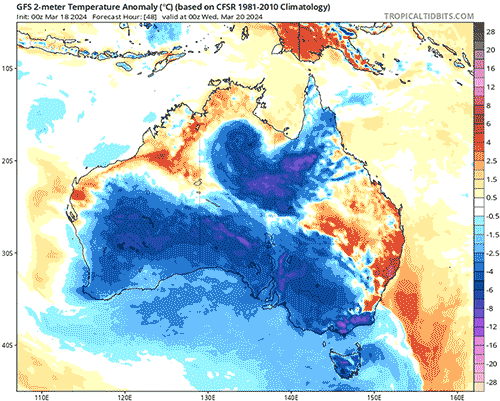Unexpected snow in Saudi Arabia
In the desert of Afif, west of Riyadh, it snowed unexpectedly, and both citizens and tourists were shocked. A significant drop in temperatures was expected with strong north-westerly winds making it even colder. Last year (2023), parts of Saudi Arabia saw its first snowfall in 100 years. [emphasis, links added]
Bolstered by the increasing snowfall in recent years (despite the “devastating effects of climate change”), Saudi Arabia is working to improve its mountain tourism with its ski resort to be built by 2026.
Freezing Australia
This past week, the Australian continent saw temperature anomalies of up to 28°C below the multi-decadal norm, affecting large regions:

–57,9°C in Greenland
Temperatures in Greenland have fallen sharply as the thermometer in Summit showed -55.1°C on Saturday.
On Monday it got even colder, falling to -57.9°C; that’s about 15°C below the seasonal norm.

The exceptional cold in the far north has contributed to the Arctic sea ice extent being above the average for the period 2011-2020 and is rapidly approaching the average for the period 2001-2010.

Obviously, the Arctic is surprising the experts, who warned that sea ice there was supposedly in rapid decline.
Unusual, record-breaking cold in India
Intense cold persists in Indian cities like Bhubaneswar, Cuttack, Puri, Chandbali, Paradeep, and Baripada, which are experiencing record-breaking low temperatures.
On Wednesday, many places in the eastern state of Odisha experienced the coldest March days ever. In Bhubaneswar, a maximum temperature of only 19.2°C was recorded yesterday, breaking the previous record of 24.3°C by a whopping 5°C!
In northern India, snow from the north is bringing down temperatures in the lower latitudes in central and southern India.
In many cities, including the eastern metropolitan cities of Bhubaneswar, Cuttack, Puri, Chandbali, Paradeep, and Baripada, record low March temperatures were recorded, beating benchmarks from the 1970s and beyond.
Record low in New Zealand
In the southern hemisphere, where summer has come to an end, the temperature in Whanganui, New Zealand dropped to 4°C on Wednesday morning, the second lowest March temperature in the town’s history. The lowest March low of all-time was recorded on March 28, 1985 (solar minimum of the 21st cycle), at 2.5°C.
New lows recorded in Australia
A severe cold snap has hit southeastern Australia. In the mountains of New South Wales, there was frost in the Perisher Valley with temperatures as low as -5.7°C. This is only 1.4°C above the national record for March. Thredbo recorded -4.4°C. Cooma also recorded an impressive -1.9°C.
In Mt. Hotham, Victoria, the national record was missed by just 1.2°C, at -3.1°C. Monthly records also fell in Omeo, Victoria: on Thursday morning, the temperature of -0.7°C was a whole 1°C below the previous record (2021).
And in Cleve, South Australia, the temperature of 6.8°C also exceeded the old record by 1°C (yet to be confirmed).
Temperature in Antarctica plummets to near -68°C
On March 21, the seasonal minimum at Concordia dropped to -67.7°C, from -67.4°C on March 20. Antarctica is cooling, the data is clear…
Full report (in German) at EIKE here
Compiled by Christian Freuer
Also see: electroverse.substack.com/
The preceding are excerpts from EIKE
Top photo of Greenland coast by Hubert Neufeld on Unsplash
Read more at No Tricks Zone




















But as the Climate Change Pushers would say, “This is just weather and has nothing to do with man-made climate change”. However, if the numbers were the opposite and these places all showed warmer than average, that would have been proof positive of we humans causing the “climate” to be getting worse.
Record lows for all those Nations Kiwi Land and the Land down under Greenland as well but they will find a way to blame this on Global Warming/Climate Change like most all the crack-pots do
Milankovich cycle: Invest in winter clothes.
On Sunday, an NHRA race outside of Los Angeles (Pomona) was cut short by hail. Most people at the track were bundled up against the cold. Maybe we’ve passed the peak of a temperature cycle, heading lower. Is our power grid ready?